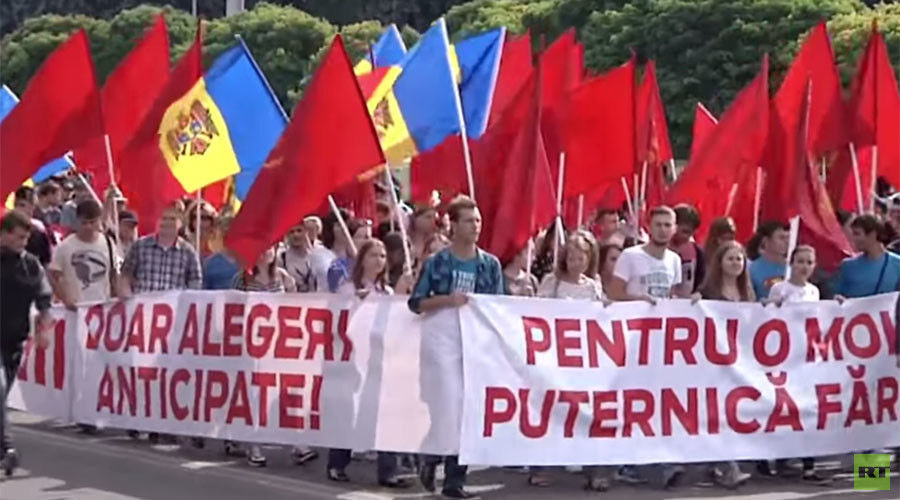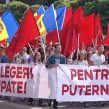
Moldova’s Regime-Change Movements: Pro-Russia Ascendant, Pro-West Losing Steam (Part Two)
Publication: Eurasia Daily Monitor Volume: 12 Issue: 180
By:

*To read Part One, please click here.
The pro-Europe civil-society group, “Platform for Dignity and Truth,” introduced the demands for new parliamentary and presidential elections to be held in Moldova promptly. This can only play into the hands of pro-Russia parties (see Part One). Paradoxically, the Platform itself is not a political party—it is undecided about turning itself into one—and has no allies among the existing political parties, apparently detesting them and institutional politics across the board (the Platform itself behaves like a metapolitical, direct-democracy group). Platform leaders are aware that the pro-Russia parties would remove the incumbent “pro-Europe” government through elections, if these are held any time soon.
Leading their own protest movement, parallel to the Platform’s, the pro-Russia parties—Igor Dodon’s Socialists and Renato Usatii’s Our Party—are themselves clamoring for pre-term elections, barely one year after Moldova’s November 2014 parliamentary elections. The Socialists became the strongest parliamentary party in those elections; and Our Party (which was disqualified in November 2014, but reinstated afterward) did well in the June 2015 country-wide local elections (see EDM, July 1, 2).
The pro-Russia parties feel more confident now, as the worst corruption scandals erupted and ballooned after those elections had been held, dragging the pro-Europe government further into disrepute. Politically, the most salient affair is that of the “stolen billion(s)” from Moldova’s banking system, resulting in massive depreciation of the national currency, with corresponding price hikes for energy and all other imported necessities. The three governing parties were still able to use pro-Europe slogans in the November 2014 elections, garnering a combined 45 percent of the votes cast. But they will hardly be able to recycle those slogans if new elections are held.
In such circumstances the Pro-Russia parties would probably win any pre-term parliamentary elections, as well as winning a presidential election by popular vote. In the latest public opinion poll, 87 percent—an all-time record—believe that Moldova is going “in the wrong direction.” The poll shows Our Party at 23 percent, the Socialists at 21 percent, and the Communists at 10 percent, in terms of party preferences among likely voters. (A combined 44 percent of the votes cast would give Our Party and the Socialists a simple parliamentary majority under the proportional system.) The three parties of the governing coalition register, each, at between 7 percent and 9 percent in this poll. Conducted by a long-established organization (CBS-Axa), this poll’s findings may be questioned at the margins, but they are seen as reflecting the overall political trends in Moldova (Infotag, September 29, 30; Ziarul National, October 2).
The Platform has now raised the stakes significantly, toying for the first time with the tactics of civil disobedience and dual power. At the October 4 rally, Platform leaders proposed and the crowd acclaimed a resolution to: organize a “People’s Guard” of military and police veterans for “protection” of the Platform’s events; set up “strike committees” to prepare work stoppages in various enterprises, schools, and (specifically) bus and rail transportation units, ultimately for a “general strike”; prepare to set up roadblocks; stop (and call on the population to stop) paying for electricity and heating services; and encourage individuals and companies to withhold taxes from the state budget—all this in order to topple “The Junta” from power, according to the movement’s main media outlet (Jurnal.md, Noi.md, October 4, 5).
Such calls should be seen as marks of despair, not strength or organizational capacity. The Platform is radicalizing to avoid dropping out of the game altogether. Attendance at the Platform’s rallies in Chisinau has declined continuously, from a peak of 40,000 at the Platform’s September 6 rally, down to 10,000 or 12,000 thousand on October 4. The pro-Russia parties drew 15,000 to 20,000 at their first rally on September 27 (Infotag, Unimedia, September 6–7, September 27–28, October 4–5).
For their part, the Socialists and Our Party are playing by the formal constitutional rules. At least for the time being they do not hint at civil disobedience or dual power tactics (although they possess some capacity for the latter). They use color-revolution trappings as an accompaniment to their main game, which is constitutional and parliamentary at this stage.
The pro-Russia parties’ tent camp and non-stop rally is historically unprecedented for Moldova and internationally. Moldova’s “Russian-speaking population” hardly ever participated in political protests. But the psychological barrier seems to have been broken, as Dodon and Usatii have brought a mixed crowd of Russian-speakers and Romanian-speakers to these protests and are addressing the participants in both languages. The other novelty has international significance: These pro-Kremlin parties have adopted the Kremlin-despised color-revolution methods in a post-Soviet country for the first time.
The Platform can try to agitate for regime change, but lacks the strength to achieve it. The pro-Russia parties are stronger, and their destabilizing potential is far more dangerous, although held in reserve. They are capable of finishing on their terms the hazardous game that the naive Platform started.




